外研版七年级英语下册 Module5 My school day模块复习课件(共92张PPT)
文档属性
| 名称 | 外研版七年级英语下册 Module5 My school day模块复习课件(共92张PPT) | 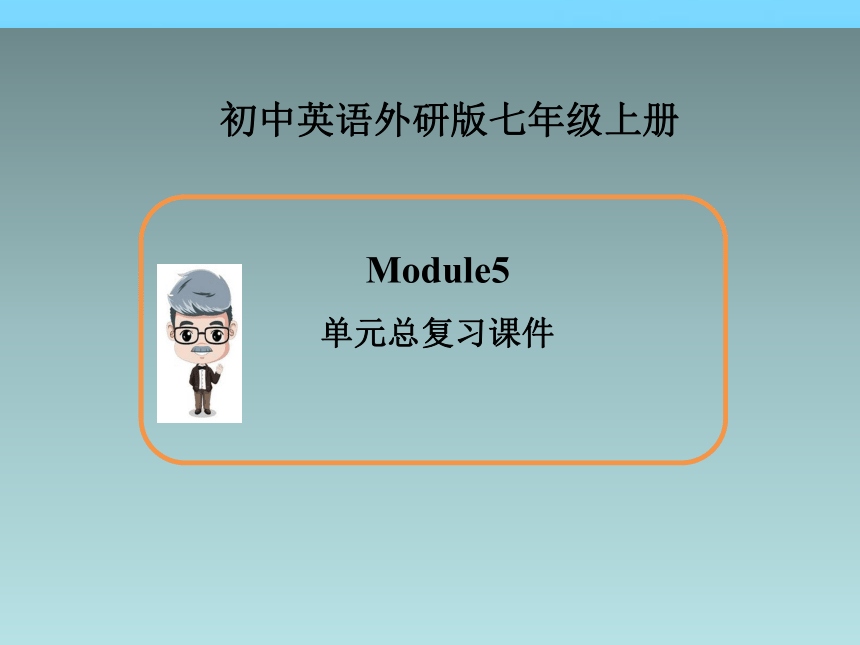 | |
| 格式 | ppt | ||
| 文件大小 | 2.4MB | ||
| 资源类型 | 教案 | ||
| 版本资源 | 外研版 | ||
| 科目 | 英语 | ||
| 更新时间 | 2022-06-22 19:15:49 | ||
图片预览

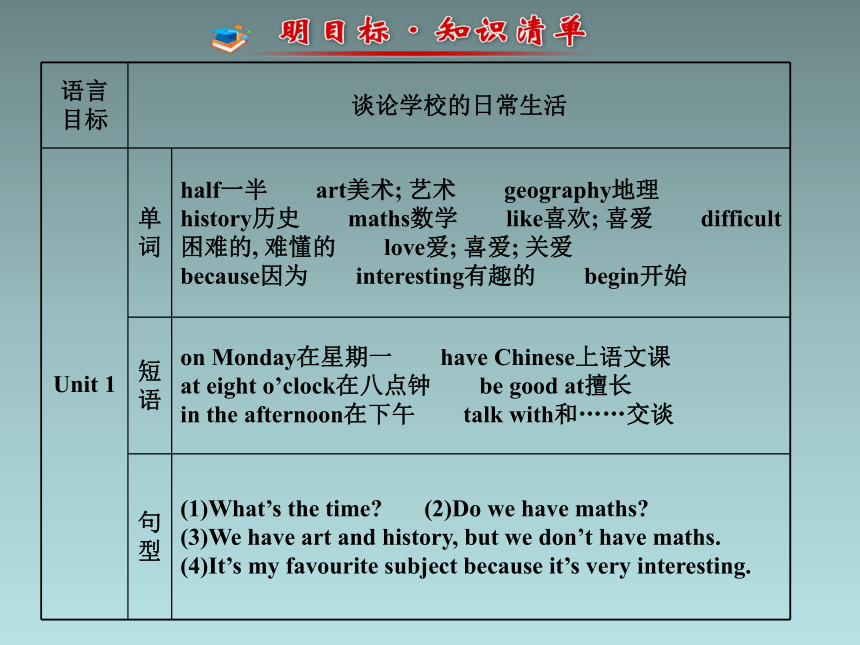
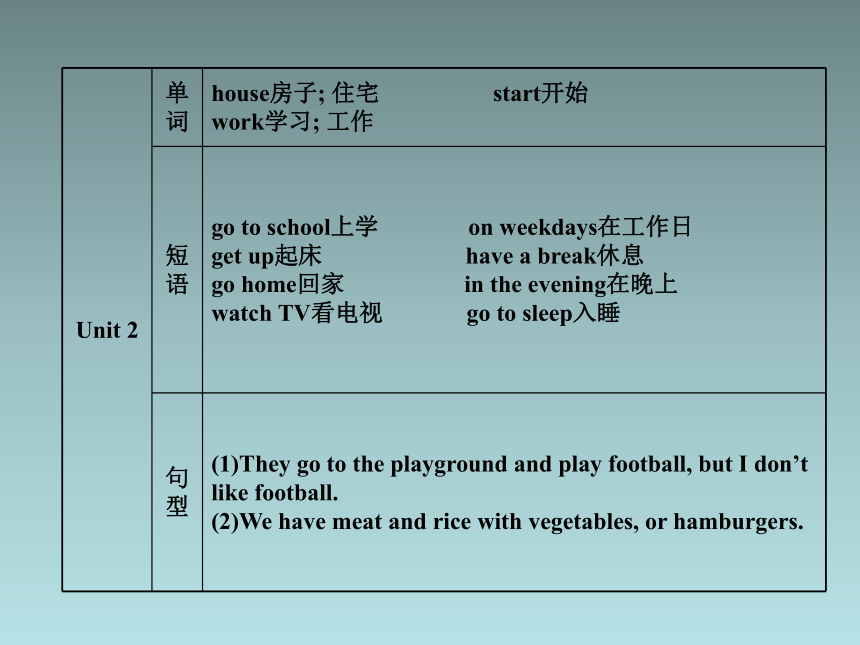
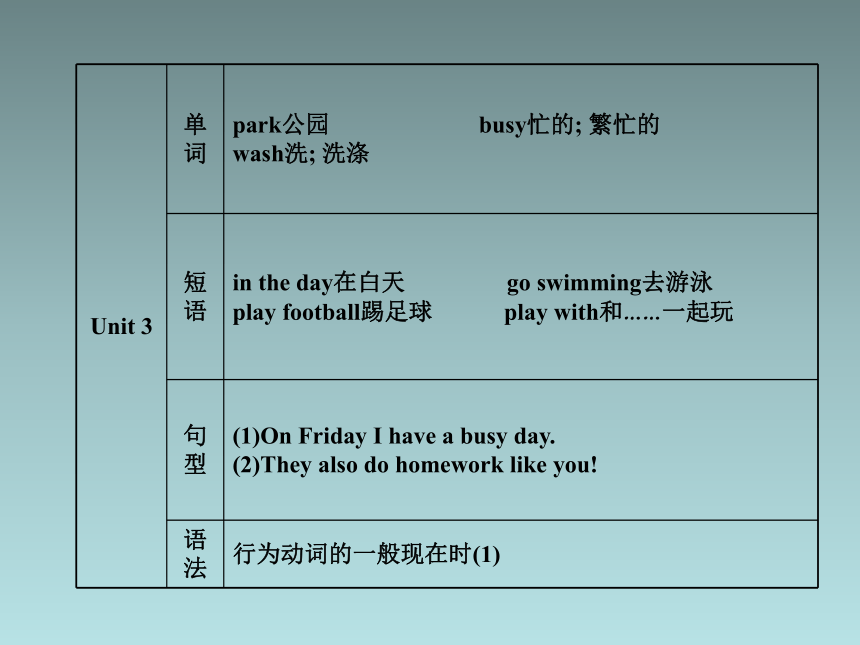
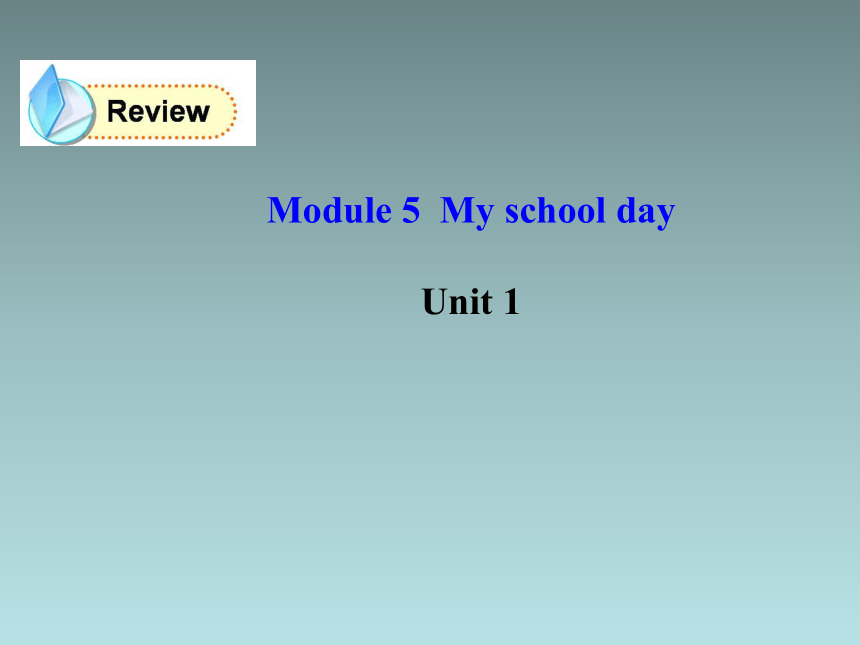
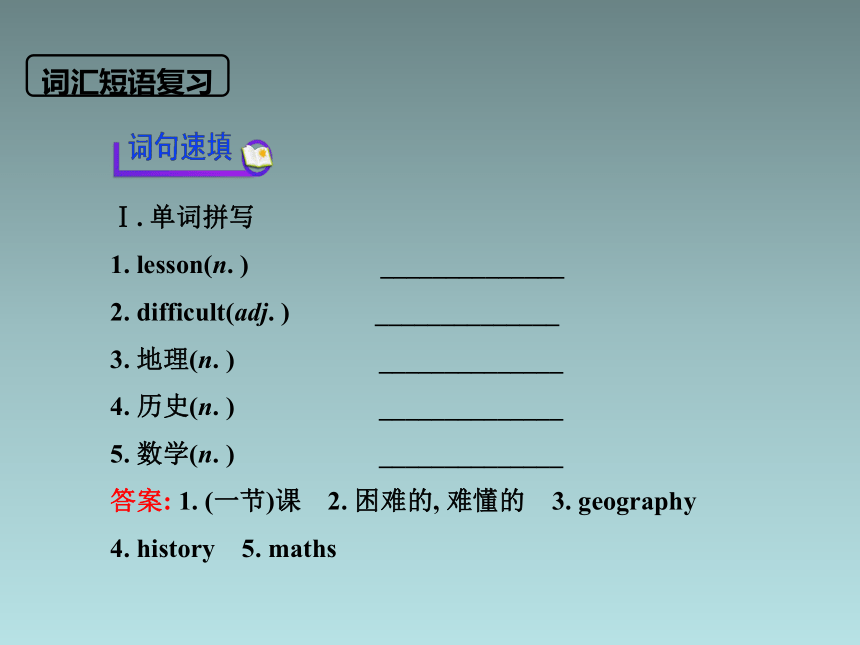
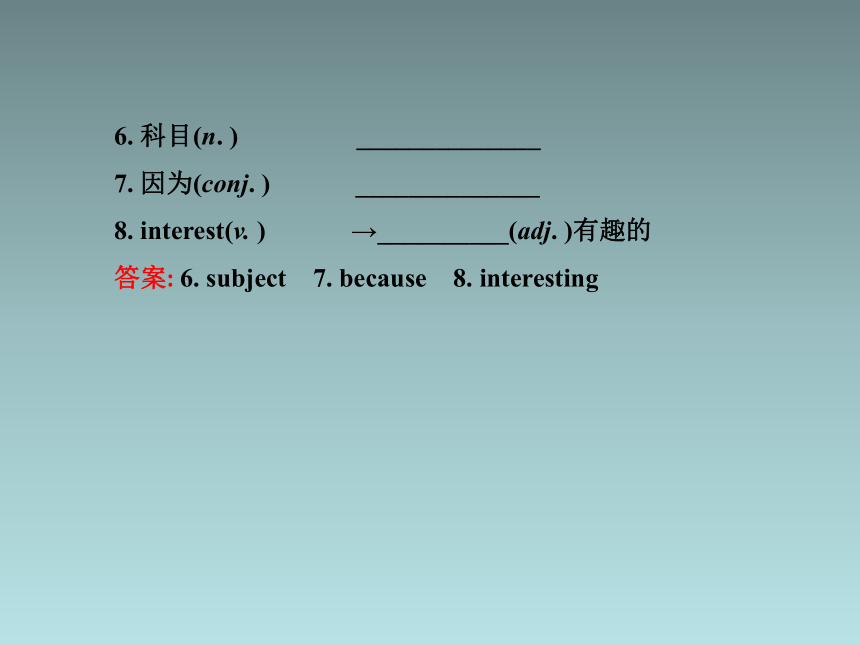
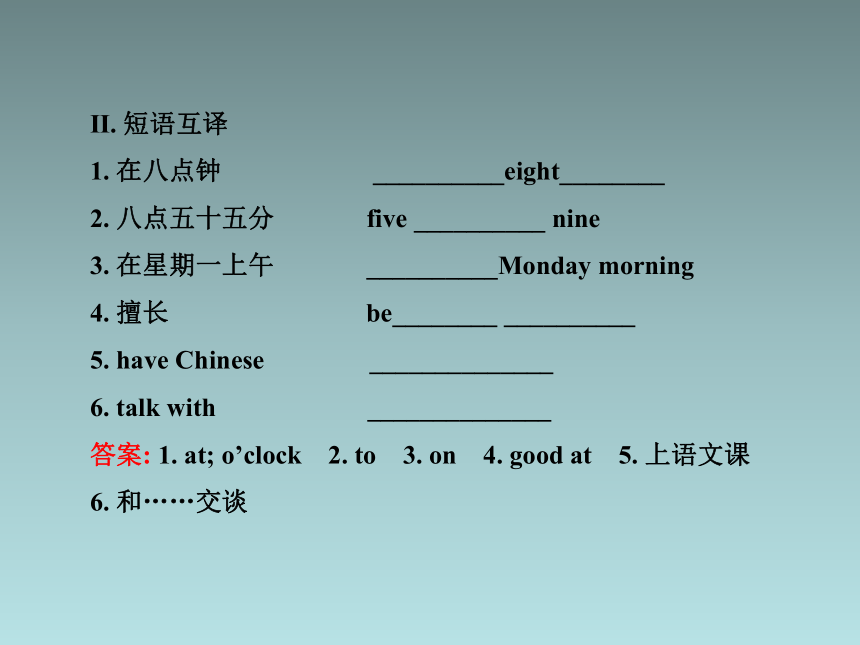
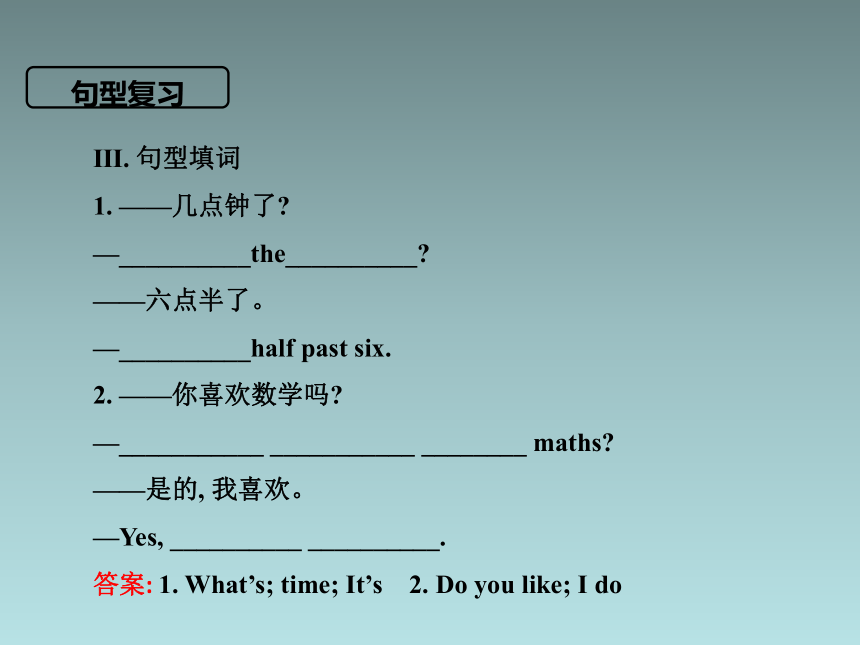
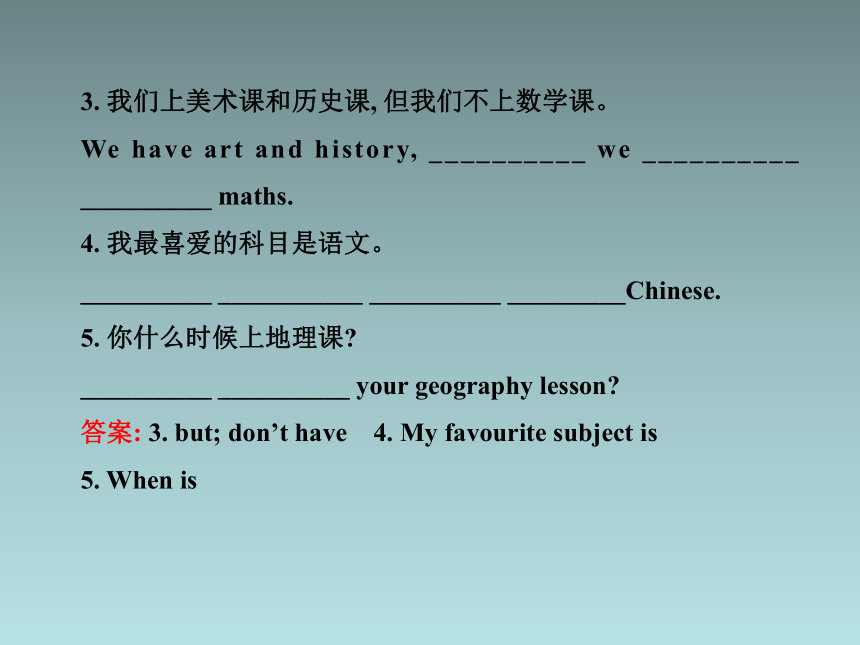
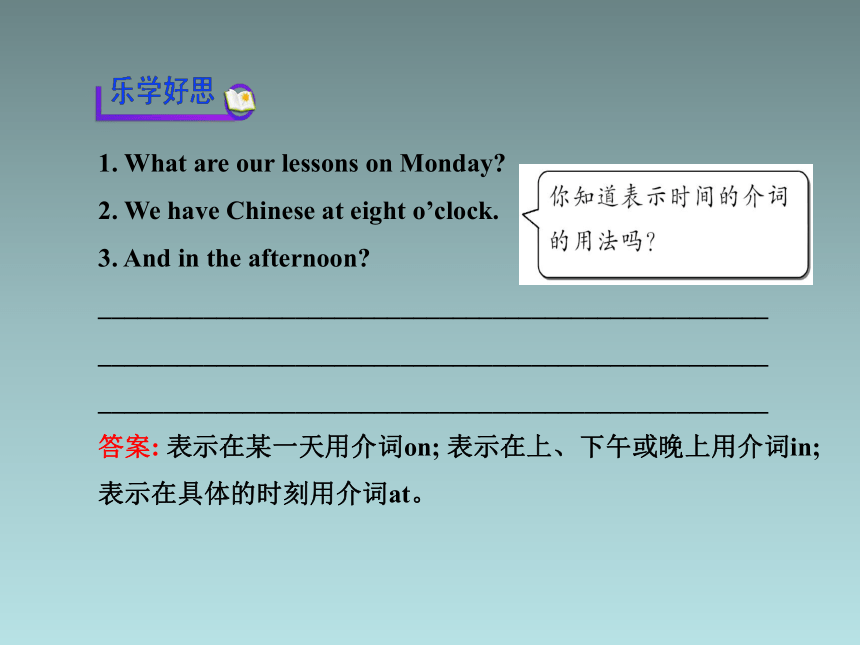
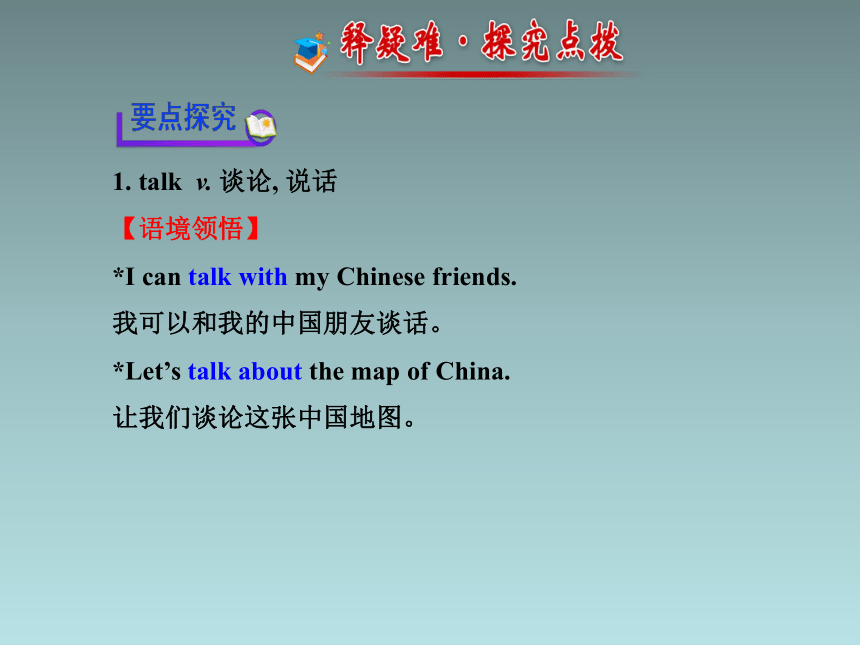
文档简介
(共92张PPT)
Module5
单元总复习课件
初中英语外研版七年级上册
语言
目标 谈论学校的日常生活
Unit 1 单
词 half一半 art美术; 艺术 geography地理 history历史 maths数学 like喜欢; 喜爱 difficult困难的, 难懂的 love爱; 喜爱; 关爱
because因为 interesting有趣的 begin开始
短
语 on Monday在星期一 have Chinese上语文课 at eight o’clock在八点钟 be good at擅长
in the afternoon在下午 talk with和……交谈
句
型 (1)What’s the time (2)Do we have maths
(3)We have art and history, but we don’t have maths.
(4)It’s my favourite subject because it’s very interesting.
Unit 2 单词 house房子; 住宅 start开始 work学习; 工作
短语 go to school上学 on weekdays在工作日
get up起床 have a break休息
go home回家 in the evening在晚上
watch TV看电视 go to sleep入睡
句型 (1)They go to the playground and play football, but I don’t like football.
(2)We have meat and rice with vegetables, or hamburgers.
Unit 3 单词 park公园 busy忙的; 繁忙的
wash洗; 洗涤
短语 in the day在白天 go swimming去游泳
play football踢足球 play with和……一起玩
句型 (1)On Friday I have a busy day.
(2)They also do homework like you!
语法 行为动词的一般现在时(1)
Module 5 My school day
Unit 1
Ⅰ. 单词拼写
1. lesson(n. ) ______________
2. difficult(adj. ) ______________
3. 地理(n. ) ______________
4. 历史(n. ) ______________
5. 数学(n. ) ______________
答案: 1. (一节)课 2. 困难的, 难懂的 3. geography
4. history 5. maths
词汇短语复习
6. 科目(n. ) ______________
7. 因为(conj. ) ______________
8. interest(v. ) →__________(adj. )有趣的
答案: 6. subject 7. because 8. interesting
Ⅱ. 短语互译
1. 在八点钟 __________eight________
2. 八点五十五分 five __________ nine
3. 在星期一上午 __________Monday morning
4. 擅长 be________ __________
5. have Chinese ______________
6. talk with ______________
答案: 1. at; o’clock 2. to 3. on 4. good at 5. 上语文课
6. 和……交谈
Ⅲ. 句型填词
1. ——几点钟了
—__________the__________
——六点半了。
—__________half past six.
2. ——你喜欢数学吗
—___________ ___________ ________ maths
——是的, 我喜欢。
—Yes, __________ __________.
答案: 1. What’s; time; It’s 2. Do you like; I do
句型复习
3. 我们上美术课和历史课, 但我们不上数学课。
We have art and history, __________ we __________ __________ maths.
4. 我最喜爱的科目是语文。
__________ ___________ __________ _________Chinese.
5. 你什么时候上地理课
__________ __________ your geography lesson
答案: 3. but; don’t have 4. My favourite subject is
5. When is
1. What are our lessons on Monday
2. We have Chinese at eight o’clock.
3. And in the afternoon
___________________________________________________
___________________________________________________
___________________________________________________
答案: 表示在某一天用介词on; 表示在上、下午或晚上用介词in; 表示在具体的时刻用介词at。
1. talk v. 谈论, 说话
【语境领悟】
*I can talk with my Chinese friends.
我可以和我的中国朋友谈话。
*Let’s talk about the map of China.
让我们谈论这张中国地图。
*The teacher is talking to his students.
老师正在对学生们讲话。
*My grandparents often talk of the old days.
我的爷爷奶奶经常谈起过去的日子。
【自主归纳】
talk用作动词, 意为“谈话; 说话”, 常构成固定搭配:
【归纳拓展】
talk的不同词性
talk还可以作名词, 意为“谈论; 讨论”, 常构成短语: have a talk“谈话”。例如: Let’s have a talk about our favourite lessons. 让我们谈一谈我们最喜欢的功课。
【学以致用】
史密斯先生正在和比尔的老师谈话。
Mr. Smith is __________ __________ Bill’s teacher.
答案: talking with/to
【授课备选】补充练习
他们通常谈论足球比赛。
They usually _________ ___________ the football matches.
答案: talk about
2. because conj. 因为
【语境领悟】
*It’s my favourite subject because it’s very interesting.
它是我最喜欢的学科, 因为它很有趣。
*Maths is very difficult so I don’t like it.
数学很难, 所以我不喜欢它。
【自主归纳】
because作连词, 意为“因为”, 引导原因状语从句。在英语中because和so不能在同一个句子中出现。
例如: I’m going to Disneyland because I like Mickey Mouse.
= I like Mickey Mouse so I’m going to Disneyland.
因为我喜欢米老鼠, 所以我要去迪斯尼乐园。
【温馨提示】
对because引导的原因状语从句提问用why。例如:
—Why do you like music ——你为什么喜欢音乐
—Because it’s relaxing. ——因为它令人放松。
【学以致用】
①Martin can’t go to school today, ______ he is ill(生病).
A. and B. but C. so D. because
②I like Lucy a lot because she is very kind. (对画线部分提问)
________ __________ ____________ like Lucy a lot
答案: Why do you
3. —What’s the time 几点钟了
—It’s twelve o’clock. 十二点了。
【句型剖析】
What’s the time 意为“几点了 ”, 常用来对具体的时刻进行提问, 相当于“What time is it ”。回答时用“It’s +具体时刻.”。
【妙辨异同】when与what time提问时间的不同
单 词 用 法 例 句
when 为疑问副词, 意为“什么时候, 何时”, 用于提问时间, 所表示的时间范围广 例如: —When will he come back —He will come back tomorrow. ——他什么时候回来 ——他明天回来。
what time 所表示的时间比较准确, 指“几点钟”, 或“几时几分” 例如: —What time is it
—It’s ten past three.
——几点了
——三点十分了。
【学以致用】
①It’s eleven past twelve. (对画线部分提问)
__________the__________
②(2013·重庆中考A卷)She often has dinner at half past six in the evening. (对画线部分提问)
__________ __________does she often have dinner in the evening
答案: ①What’s; time ②What time
【备选要点】
1. 时间表达法
【语境领悟】
*It’s twelve o’clock. 十二点了。
*It’s twenty past one. 一点二十分了。
*It’s half past six. 六点半了。
*It’s twenty to eleven. 十点四十分了。
【自主归纳】
整点 基数词+o’clock
非
整
点 顺读法 先说小时数, 后说分钟数
逆读法 时间未过半: 分钟+past+点钟
时间刚好一半: half past+点钟
时间已过半: (60-分钟)+to+(点钟+1)
【归纳拓展】 表达一刻钟
当分钟数是15的时候, 可以用a quarter(一刻钟)来表示。例如: a quarter past five 5: 15。
【巧学助记】
“时”在前, “分”在后,
quarter, half不能有;
如何使用past, to, 我们可要看清楚;
前是“分”, 后是“点”, past或to立中间;
past是加to是减;
如果表示“几点半”, 要用half加钟点。
【学以致用】
①(2013·泉州中考)—What’s the time, please
—It’s a quarter ______ eight.
A. past B. at C. to
②用英文表达下列时间:
9: 00________
12: 40________
4: 30________
答案: nine o’clock twenty to one half past four
2. 表示时间的介词on, at, in
【语境领悟】
*What are our lessons on Monday 星期一我们上什么课
*We have Chinese at eight o’clock.
在八点钟, 我们上语文课。
*I like the lessons on Monday afternoon.
我喜欢星期一下午的课。
*What lessons do you have in the afternoon
下午你们上什么课
【自主归纳】
(1)on常用来指特定、具体的某一天或某一天的上午、下午、晚上。例如: on Friday在周五; on a silent night在一个寂静的夜晚。
(2)at既可以表示时间点(在……点钟; 在几点几分), 也可以表示时间段(在……期间)。例如: at six o’clock在六点钟; at Spring Festival在春节。
(3)in常用以指时间段, 泛指在上午、下午、晚上, 在某个月份、季节、年等。例如: in the evening在晚上; in summer在夏天。
【学以致用】
—When is Jay’s concert(音乐会)
—It’s ______ three o’clock ______ the afternoon.
A. at; in B. at; on C. on; in D. in; on
Ⅰ. 用英文表达下列时间
答案: 1. half past seven 2. twenty-five past eight
3. ten o’clock 4. half past one
5. twelve o’clock 6. a quarter to one
Ⅱ. 单项选择
1. (2013·梅州中考)—When did the earthquake in Lushan happen
—It happened______8: 02______the morning of April 20, 2013.
A. on; in B. at; in
C. at; on D. on; on
2. I like swimming, but I ______ like skating.
A. am not B. not C. don’t D. doesn’t
3. —______
—It’s seven o’clock.
A. What time is it B. What’s it
C. When is it D. How long is it
【变式训练】
—______will you come back
—Maybe tomorrow.
A. What time B. What day
C. When D. How
【解析】选C。考查疑问词辨析。what time提问具体的时刻; what day提问星期几; when可以提问具体时刻, 也可以提问日期; how意为“怎么样”。故选C。
4. Are you good ______ maths
A. in B. to C. at D. for
5. —May I talk ______ you about the picture
—Certainly.
A. about B. for C. of D. with
Module 5 My school day
Unit 2
Ⅰ. 单词拼写
1. house(n. ) ______________
2. start(v. ) ______________
3. evening(n. ) ______________
4. 工作日(n. ) ______________
5. (课间)休息(n. ) ______________
答案: 1. 房子; 住宅 2. 开始 3. 晚上 4. weekday
5. break
词汇短语复习
6. 家庭作业(n. ) ______________
7. 睡觉(n. & v. ) ______________
答案: 6. homework 7. sleep
Ⅱ. 选词配图
go to school, get up, have breakfast
do one’s homework, go to bed, watch TV
答案: 1. do one’s homework 2. go to school 3. watch TV
4. have breakfast 5. get up 6. go to bed
Ⅲ. 句型填词
1. 我在工作日去上学, 但周六和周日不去。
I go to school___________ _________, ___________ _________ on Saturday and Sunday.
2. 这是我一天的学校生活。
_________ ___________my school day.
3. 我早上七点半起床, 然后吃早餐。
I get up at half past seven in the morning, __________ __________ have breakfast.
答案: 1. on weekdays; but not 2. This is 3. and then
句型复习
4. 在十一点, 我们在操场上休息一会, 我和朋友们一起谈话。
At eleven o’clock, we___________ __________ _________in the playground and I__________ __________my friends.
5. 我不喜欢足球。
_________ _________ ____________football.
答案: 4. have a break; talk to 5. I don’t like
1. Which school is Alex Greenall in
________________________________
2. Where is Alex Greenall’s school
________________________________________
3. What lesson does Alex Greenall like best
________________________________________
答案: 1. Park School. 2. In Oxford, England.
3. Art.
4. Does Alex Greenall have lunch at school or at home
_______________________________________________
5. How many lessons do they have in a school day
_______________________________________________
答案: 4. At school. 5. Five.
1. work n. 学习; 工作
v. 学习; 工作
【语境领悟】
*We start work at nine o’clock. 我们在九点开始学习。
*She isn’t working now. 她现在没在工作。
【自主归纳】
(1)work作不可数名词, 意为“学习; 工作”, 其前不能用不定冠词a修饰, 其后也不能加s, 短语start work意为“开始工作/学习”。
(2)work还可作动词, 意为“学习; 工作”。例如: She works hard. 她工作努力。
【学以致用】
现在我有一些工作要做。
I have __________ __________ to do now.
答案: some work
2. watch v. 看, 观看
【语境领悟】
*In the evening, I watch TV and have dinner with my family.
晚上我和家人一起看电视、吃晚饭。
*Have you got a watch 你有手表吗
【自主归纳】
(1)watch作动词, 意为“看, 观看”, 指非常仔细地、全神贯注地“看”, 用在看电视、看足球及篮球等各种球赛等场合。表示用眼睛跟踪、注视某物以观察到每一个动作、变化、危险迹象、机会等。
(2)watch还可以作名词, 意为“手表”, 是可数名词。
【妙辨异同】“看”不同
look 意为“看”, 表示有意识地观看, 强调“看”的动作。例如: Look! How happily they are playing! 看! 他们玩得多么高兴啊!
look后面接介词at, 再接宾语。例如: Look at the blackboard, please. 请看黑板。
see 意为“看到; 看见”, 强调结果。例如: What can you see in the picture 你能在图画里看到什么
see常与一些名词构成词组: see a film“看电影”; see a doctor“看医生”
【学以致用】
选词填空 look at/ see/ watch。
①Do they__________a football game at weekends(在周末)
②__________the kite. It’s flying very high.
③When the sun goes down(落下), we can__________the stars.
答案: ①watch ②Look at ③see
3. have a break 休息
【语境领悟】
*At eleven o’clock, we have a break in the playground.
十一点时, 我们在操场上休息。
*We have lunch in the dining hall at half past twelve.
我们十二点半在餐厅吃午餐。
*I have a new computer.
我有一台新电脑。
【自主归纳】
(1)have a break意为“休息”, 相当于have a rest。此处break作可数名词, 意为“(课间)休息”。
(2)“have+a +动词意义的名词”, 表示短暂的动作。例如: have a look, have a swim, have a break等。
【归纳拓展】have的三种用法
【温馨提示】
have a lesson上课 have a talk交谈
have a good time玩得高兴 have a drink喝一杯
have a meeting开会 have breakfast/dinner吃早饭/晚饭
【学以致用】
我很累。可以休息一下吗
I’m very tired. May I __________ ___________ _________
答案: have a break/rest
【授课备选】补充练习
①我经常和父母一起吃晚饭。
I often __________ __________ with my parents.
②詹姆斯有一个蓝色的书包。
James __________ a blue bag.
③我们每年举行一次运动会。
We __________ __________ sports meeting every year.
答案: ①have dinner ②has ③have a
Ⅰ. 从方框中选择合适的短语并用其适当形式填空
go to school, go to sleep, have dinner, start work, talk to
1. The little boy__________on weekdays. He is always tired.
2. We__________at the dining room at 6: 30 p. m.
3. I often__________my friends about my trouble(苦恼).
4. At 8: 00, we__________and we clean the room after work.
5. I’m too sleepy(困倦的). So I will__________very soon(很快).
答案: 1. goes to school 2. have dinner 3. talk to
4. start work 5. go to sleep
Ⅱ. 完成句子
1. 早晨我五点半起床。
I ______ ______ at half past five in the morning.
2. 我们累了, 让我们休息一下吧。
We are tired, let’s ______ ______ ______.
3. 他们放学后经常在一起做作业。
They often _____ _______ ______ together after school.
答案: 1. get up 2. have a break/rest
3. do their homework
4. 你下午将什么时候回家
When will you ______ ______ in the afternoon
5. 我晚上十点钟上床睡觉。
I ______ _______ _____ at ten o’clock in the evening.
答案: 4. go home 5. go to bed
Module 5 My school day
Unit 3
busy adj. 忙的; 繁忙的
【语境领悟】
*On Friday I have a busy day. 星期五, 我一天都很忙。
*Amy is busy with her work now.
埃米现在正在忙于她的工作。
*Dick is busy mending his bike.
迪克正在忙着修自行车。
【自主归纳】
(1)busy意为“繁忙的, 忙碌的”, 作形容词可置于系动词之后作表语, 也可用在名词之前作定语, 其反义词为free。
(2)busy常用于两种搭配:
①be busy with sth. “忙于某事”。例如: I am busy with my work. 我正忙于我的工作。
②be busy doing sth. “忙于做某事”。例如:
We are busy cleaning the room. 我们正忙于打扫房间。
【学以致用】
①Li Yi is busy __________ his homework.
A. with B. at C. to D. in
②They are busy ______ (read) the books.
答案: reading
行为动词的一般现在时(1)
【语境领悟】
仔细观察例句, 体会一般现在时的用法。
①We have Chinese at eight o’clock.
②We don’t have maths.
③—Do you like maths
—Yes, I do.
④—Do we have maths
—No, we don’t.
语法复习
【知识构建】一般现在时三要素
1. 含义。行为动词的一般现在时表示经常性或习惯性的动作, 也可表示现在的状态。
2. 动词形式。当主语是第一人称、第二人称或第三人称复数或复数名词时, 谓语动词用原形, 当主语是第三人称单数时, 谓语动词要用第三人称单数形式。
3. 基本句式。
(1)肯定句: 主语+动词原形+其他.
(2)否定句: 主语+don’t +动词原形+其他.
(3)一般疑问句: Do+主语+动词原形+其他
肯定回答: Yes, 主格代词+do.
否定回答: No, 主格代词+don’t.
(4)特殊疑问句: 疑问词+do +主语+其他
【学以致用】句型转换
1. We have some English books on the shelf. (改为否定句)
We _______ _____ ______ English books on the shelf.
2. They often go to work at weekends. (改为一般疑问句)
______ ______often ______ to work at weekends
3. Do you come from America (作否定回答)
______, ______ ______.
答案: 1. don’t have any 2. Do they; go
3. No; I/we don’t
4. Do Sally and Betty have the same classes on Monday (作肯定回答)
______, ______ ______.
5. We go home at half past five. (对画线部分提问)
______ ______ you ______ home
答案: 4. Yes; they do 5. When do; go
根据图片提示以My School Day为题写一篇短文。
【思路点拨】
(1)体裁: 记叙文。
(2)人称: 第一人称。
(3)时态: 一般现在时。
【写作模板】
【妙笔成篇】
___________________________________________________
___________________________________________________
___________________________________________________
___________________________________________________
___________________________________________________
___________________________________________________
___________________________________________________
【佳作鉴赏】
My School Day
I have a busy school day. I usually get up at 6: 00 a. m. At
7: 00 a. m. , I have breakfast. I go to school at 7: 10 a. m. . Lessons start at 8: 00 a. m. . At 4: 30 in the afternoon, I play football with my classmates in the playground. After dinner, I do my homework. I go to bed at 9: 00 in the evening. What a happy and busy day!
Ⅰ. 用方框中所给词的适当形式填空
face, busy, park, wash, minute
1. It’s a __________ day today. We have a lot of work to do.
2. There are 60 __________ in an hour.
3. —What a beautiful girl!
—Yes, her eyes are big and her __________ is round(圆的).
4. Please __________ your hands before you have lunch.
5. There are some beautiful flowers in the __________.
答案: 1. busy 2. minutes 3. face 4. wash 5. park
Ⅱ. 句型转换
1. Mr. Wang doesn’t make his lessons interesting. (改为肯定句)
Mr. Wang __________ his lessons__________.
2. It’s two o’clock. (对画线部分提问)
___________ _________ __________
3. have, to, they, day, lessons, go, and, every, school, their(. )(连词成句)
____________________________________________________
答案: 1. makes; interesting 2. What’s the time
3. They go to school and have their lessons every day.
4. I watch TV at night with my mother. (改为一般疑问句, 并作肯定回答)
—__________ ____________ ________ TV at night with __________ mother
—__________, __________ __________.
5. They often start their work at 7: 30 in the morning. (改为否定句)
They __________ often __________ their work at 7: 30 in the morning.
答案: 4. Do you watch; your; Yes; I do 5. don’t; start
模块复习课
Module 5
Ⅰ. 词汇速记
1. 地理(n. ) ______________
2. 历史(n. ) ______________
3. 数学(n. ) ______________
4. 困难的(adj. ) ______________
5. 科目(n. ) ______________
答案: 1. geography 2. history 3. maths 4. difficult
5. subject
词汇短语复习
6. 忙的; 繁忙的(adj. ) ______________
7. half(n. ) →__________(复数)
8. begin( v. ) →__________(同义词)开始
9. interest( v. ) →__________(adj. )有趣的
答案: 6. busy 7. halves 8. start 9. interesting
Ⅱ. 短语互译
1. 上语文课 ______Chinese
2. 在十点半 at______ ______ten
3. 和某人谈话 talk______/______sb.
4. 课间休息 have________ __________
5. go home ______________
6. have lunch ______________
答案: 1. have 2. half past 3. with; to 4. a break
5. 回家 6. 吃午饭
7. go to bed ________________
8. do one’s homework ______________
9. go to sleep ______________
答案: 7. 上床睡觉 8. 做作业 9. 睡觉
Ⅲ. 句型攻关
1. ——凯特和珍妮喜欢历史课吗
—__________Kate and Jenny __________ history
——不, 她们不喜欢。
—No, __________ __________.
2. 音乐是我最喜爱的科目, 因为我喜欢唱歌。
Music _________ ___________ __________ subject __________ I like singing.
答案: 1. Do; like; they don’t 2. is my favourite; because
句型复习
3. 你的美术课是什么时候
_________ __________ ___________ your art lesson
4. 你们什么时候去公园
__________ __________ you go to the park
5. 开始工作怎么样
__________ __________ starting work
答案: 3. What time is 4. When do 5. What / How about
Ⅳ. 语法专练
(Ⅰ)用括号内所给动词的正确形式填空。
1. They __________ (like) Chinese food.
2. __________ you __________ (watch) TV every evening
3. We __________ (not play) basketball on Monday.
4. Jim and Rose __________ (go) to school in the morning.
5. __________ Mike and you __________ (eat) vegetables every day
答案: 1. like 2. Do; watch 3. don’t play
4. go 5. Do; eat
语法复习
6. I __________ (go) to bed at nine every evening.
7. They __________ (not have) dinner at home.
答案: 6. go 7. don’t have
(Ⅱ)句型转换。
1. We have geography on Monday. (改为否定句)
We ________ ________ geography on Monday.
2. I like art lessons. (改为一般疑问句)
________ you ________ art lessons
3. They do their homework in the evening. (改为否定句)
They ________ ________ their homework in the evening.
答案: 1. don’t have 2. Do; like 3. don’t do
4. Do they go to school on Saturday (作否定回答)
__________, __________ __________.
5. Do you play basketball after school (作肯定回答)
__________, __________ __________.
答案: 4. No; they don’t 5. Yes; we do
Ⅴ. 词汇串记
I have six 1 (课)a day. Each class has forty-five 2 (分钟).
There are seven 3 (科目)in Grade One. History is very 4 (有趣的), so I like it very much. I don’t like maths 5 (因为)it’s a bit 6 (困难的).
1. ______ 2. ______ 3. ______ 4. ______ 5. ______
6. ______
答案: 1. lessons 2. minutes 3. subjects 4. interesting
5. because 6. difficult
In my free time, my parents often 7 (谈话)me about my study. After finishing dinner, I 8 (开始)to do my homework in my room. I don’t 9 (看)TV in the evening on weekdays. I go to bed at ten o’clock. I’m very 10 (忙的)every day.
7. ______ 8. ______ 9. ______ 10. ____
答案: 7. talk with 8. begin/start 9. watch 10. busy
Module5
单元总复习课件
初中英语外研版七年级上册
语言
目标 谈论学校的日常生活
Unit 1 单
词 half一半 art美术; 艺术 geography地理 history历史 maths数学 like喜欢; 喜爱 difficult困难的, 难懂的 love爱; 喜爱; 关爱
because因为 interesting有趣的 begin开始
短
语 on Monday在星期一 have Chinese上语文课 at eight o’clock在八点钟 be good at擅长
in the afternoon在下午 talk with和……交谈
句
型 (1)What’s the time (2)Do we have maths
(3)We have art and history, but we don’t have maths.
(4)It’s my favourite subject because it’s very interesting.
Unit 2 单词 house房子; 住宅 start开始 work学习; 工作
短语 go to school上学 on weekdays在工作日
get up起床 have a break休息
go home回家 in the evening在晚上
watch TV看电视 go to sleep入睡
句型 (1)They go to the playground and play football, but I don’t like football.
(2)We have meat and rice with vegetables, or hamburgers.
Unit 3 单词 park公园 busy忙的; 繁忙的
wash洗; 洗涤
短语 in the day在白天 go swimming去游泳
play football踢足球 play with和……一起玩
句型 (1)On Friday I have a busy day.
(2)They also do homework like you!
语法 行为动词的一般现在时(1)
Module 5 My school day
Unit 1
Ⅰ. 单词拼写
1. lesson(n. ) ______________
2. difficult(adj. ) ______________
3. 地理(n. ) ______________
4. 历史(n. ) ______________
5. 数学(n. ) ______________
答案: 1. (一节)课 2. 困难的, 难懂的 3. geography
4. history 5. maths
词汇短语复习
6. 科目(n. ) ______________
7. 因为(conj. ) ______________
8. interest(v. ) →__________(adj. )有趣的
答案: 6. subject 7. because 8. interesting
Ⅱ. 短语互译
1. 在八点钟 __________eight________
2. 八点五十五分 five __________ nine
3. 在星期一上午 __________Monday morning
4. 擅长 be________ __________
5. have Chinese ______________
6. talk with ______________
答案: 1. at; o’clock 2. to 3. on 4. good at 5. 上语文课
6. 和……交谈
Ⅲ. 句型填词
1. ——几点钟了
—__________the__________
——六点半了。
—__________half past six.
2. ——你喜欢数学吗
—___________ ___________ ________ maths
——是的, 我喜欢。
—Yes, __________ __________.
答案: 1. What’s; time; It’s 2. Do you like; I do
句型复习
3. 我们上美术课和历史课, 但我们不上数学课。
We have art and history, __________ we __________ __________ maths.
4. 我最喜爱的科目是语文。
__________ ___________ __________ _________Chinese.
5. 你什么时候上地理课
__________ __________ your geography lesson
答案: 3. but; don’t have 4. My favourite subject is
5. When is
1. What are our lessons on Monday
2. We have Chinese at eight o’clock.
3. And in the afternoon
___________________________________________________
___________________________________________________
___________________________________________________
答案: 表示在某一天用介词on; 表示在上、下午或晚上用介词in; 表示在具体的时刻用介词at。
1. talk v. 谈论, 说话
【语境领悟】
*I can talk with my Chinese friends.
我可以和我的中国朋友谈话。
*Let’s talk about the map of China.
让我们谈论这张中国地图。
*The teacher is talking to his students.
老师正在对学生们讲话。
*My grandparents often talk of the old days.
我的爷爷奶奶经常谈起过去的日子。
【自主归纳】
talk用作动词, 意为“谈话; 说话”, 常构成固定搭配:
【归纳拓展】
talk的不同词性
talk还可以作名词, 意为“谈论; 讨论”, 常构成短语: have a talk“谈话”。例如: Let’s have a talk about our favourite lessons. 让我们谈一谈我们最喜欢的功课。
【学以致用】
史密斯先生正在和比尔的老师谈话。
Mr. Smith is __________ __________ Bill’s teacher.
答案: talking with/to
【授课备选】补充练习
他们通常谈论足球比赛。
They usually _________ ___________ the football matches.
答案: talk about
2. because conj. 因为
【语境领悟】
*It’s my favourite subject because it’s very interesting.
它是我最喜欢的学科, 因为它很有趣。
*Maths is very difficult so I don’t like it.
数学很难, 所以我不喜欢它。
【自主归纳】
because作连词, 意为“因为”, 引导原因状语从句。在英语中because和so不能在同一个句子中出现。
例如: I’m going to Disneyland because I like Mickey Mouse.
= I like Mickey Mouse so I’m going to Disneyland.
因为我喜欢米老鼠, 所以我要去迪斯尼乐园。
【温馨提示】
对because引导的原因状语从句提问用why。例如:
—Why do you like music ——你为什么喜欢音乐
—Because it’s relaxing. ——因为它令人放松。
【学以致用】
①Martin can’t go to school today, ______ he is ill(生病).
A. and B. but C. so D. because
②I like Lucy a lot because she is very kind. (对画线部分提问)
________ __________ ____________ like Lucy a lot
答案: Why do you
3. —What’s the time 几点钟了
—It’s twelve o’clock. 十二点了。
【句型剖析】
What’s the time 意为“几点了 ”, 常用来对具体的时刻进行提问, 相当于“What time is it ”。回答时用“It’s +具体时刻.”。
【妙辨异同】when与what time提问时间的不同
单 词 用 法 例 句
when 为疑问副词, 意为“什么时候, 何时”, 用于提问时间, 所表示的时间范围广 例如: —When will he come back —He will come back tomorrow. ——他什么时候回来 ——他明天回来。
what time 所表示的时间比较准确, 指“几点钟”, 或“几时几分” 例如: —What time is it
—It’s ten past three.
——几点了
——三点十分了。
【学以致用】
①It’s eleven past twelve. (对画线部分提问)
__________the__________
②(2013·重庆中考A卷)She often has dinner at half past six in the evening. (对画线部分提问)
__________ __________does she often have dinner in the evening
答案: ①What’s; time ②What time
【备选要点】
1. 时间表达法
【语境领悟】
*It’s twelve o’clock. 十二点了。
*It’s twenty past one. 一点二十分了。
*It’s half past six. 六点半了。
*It’s twenty to eleven. 十点四十分了。
【自主归纳】
整点 基数词+o’clock
非
整
点 顺读法 先说小时数, 后说分钟数
逆读法 时间未过半: 分钟+past+点钟
时间刚好一半: half past+点钟
时间已过半: (60-分钟)+to+(点钟+1)
【归纳拓展】 表达一刻钟
当分钟数是15的时候, 可以用a quarter(一刻钟)来表示。例如: a quarter past five 5: 15。
【巧学助记】
“时”在前, “分”在后,
quarter, half不能有;
如何使用past, to, 我们可要看清楚;
前是“分”, 后是“点”, past或to立中间;
past是加to是减;
如果表示“几点半”, 要用half加钟点。
【学以致用】
①(2013·泉州中考)—What’s the time, please
—It’s a quarter ______ eight.
A. past B. at C. to
②用英文表达下列时间:
9: 00________
12: 40________
4: 30________
答案: nine o’clock twenty to one half past four
2. 表示时间的介词on, at, in
【语境领悟】
*What are our lessons on Monday 星期一我们上什么课
*We have Chinese at eight o’clock.
在八点钟, 我们上语文课。
*I like the lessons on Monday afternoon.
我喜欢星期一下午的课。
*What lessons do you have in the afternoon
下午你们上什么课
【自主归纳】
(1)on常用来指特定、具体的某一天或某一天的上午、下午、晚上。例如: on Friday在周五; on a silent night在一个寂静的夜晚。
(2)at既可以表示时间点(在……点钟; 在几点几分), 也可以表示时间段(在……期间)。例如: at six o’clock在六点钟; at Spring Festival在春节。
(3)in常用以指时间段, 泛指在上午、下午、晚上, 在某个月份、季节、年等。例如: in the evening在晚上; in summer在夏天。
【学以致用】
—When is Jay’s concert(音乐会)
—It’s ______ three o’clock ______ the afternoon.
A. at; in B. at; on C. on; in D. in; on
Ⅰ. 用英文表达下列时间
答案: 1. half past seven 2. twenty-five past eight
3. ten o’clock 4. half past one
5. twelve o’clock 6. a quarter to one
Ⅱ. 单项选择
1. (2013·梅州中考)—When did the earthquake in Lushan happen
—It happened______8: 02______the morning of April 20, 2013.
A. on; in B. at; in
C. at; on D. on; on
2. I like swimming, but I ______ like skating.
A. am not B. not C. don’t D. doesn’t
3. —______
—It’s seven o’clock.
A. What time is it B. What’s it
C. When is it D. How long is it
【变式训练】
—______will you come back
—Maybe tomorrow.
A. What time B. What day
C. When D. How
【解析】选C。考查疑问词辨析。what time提问具体的时刻; what day提问星期几; when可以提问具体时刻, 也可以提问日期; how意为“怎么样”。故选C。
4. Are you good ______ maths
A. in B. to C. at D. for
5. —May I talk ______ you about the picture
—Certainly.
A. about B. for C. of D. with
Module 5 My school day
Unit 2
Ⅰ. 单词拼写
1. house(n. ) ______________
2. start(v. ) ______________
3. evening(n. ) ______________
4. 工作日(n. ) ______________
5. (课间)休息(n. ) ______________
答案: 1. 房子; 住宅 2. 开始 3. 晚上 4. weekday
5. break
词汇短语复习
6. 家庭作业(n. ) ______________
7. 睡觉(n. & v. ) ______________
答案: 6. homework 7. sleep
Ⅱ. 选词配图
go to school, get up, have breakfast
do one’s homework, go to bed, watch TV
答案: 1. do one’s homework 2. go to school 3. watch TV
4. have breakfast 5. get up 6. go to bed
Ⅲ. 句型填词
1. 我在工作日去上学, 但周六和周日不去。
I go to school___________ _________, ___________ _________ on Saturday and Sunday.
2. 这是我一天的学校生活。
_________ ___________my school day.
3. 我早上七点半起床, 然后吃早餐。
I get up at half past seven in the morning, __________ __________ have breakfast.
答案: 1. on weekdays; but not 2. This is 3. and then
句型复习
4. 在十一点, 我们在操场上休息一会, 我和朋友们一起谈话。
At eleven o’clock, we___________ __________ _________in the playground and I__________ __________my friends.
5. 我不喜欢足球。
_________ _________ ____________football.
答案: 4. have a break; talk to 5. I don’t like
1. Which school is Alex Greenall in
________________________________
2. Where is Alex Greenall’s school
________________________________________
3. What lesson does Alex Greenall like best
________________________________________
答案: 1. Park School. 2. In Oxford, England.
3. Art.
4. Does Alex Greenall have lunch at school or at home
_______________________________________________
5. How many lessons do they have in a school day
_______________________________________________
答案: 4. At school. 5. Five.
1. work n. 学习; 工作
v. 学习; 工作
【语境领悟】
*We start work at nine o’clock. 我们在九点开始学习。
*She isn’t working now. 她现在没在工作。
【自主归纳】
(1)work作不可数名词, 意为“学习; 工作”, 其前不能用不定冠词a修饰, 其后也不能加s, 短语start work意为“开始工作/学习”。
(2)work还可作动词, 意为“学习; 工作”。例如: She works hard. 她工作努力。
【学以致用】
现在我有一些工作要做。
I have __________ __________ to do now.
答案: some work
2. watch v. 看, 观看
【语境领悟】
*In the evening, I watch TV and have dinner with my family.
晚上我和家人一起看电视、吃晚饭。
*Have you got a watch 你有手表吗
【自主归纳】
(1)watch作动词, 意为“看, 观看”, 指非常仔细地、全神贯注地“看”, 用在看电视、看足球及篮球等各种球赛等场合。表示用眼睛跟踪、注视某物以观察到每一个动作、变化、危险迹象、机会等。
(2)watch还可以作名词, 意为“手表”, 是可数名词。
【妙辨异同】“看”不同
look 意为“看”, 表示有意识地观看, 强调“看”的动作。例如: Look! How happily they are playing! 看! 他们玩得多么高兴啊!
look后面接介词at, 再接宾语。例如: Look at the blackboard, please. 请看黑板。
see 意为“看到; 看见”, 强调结果。例如: What can you see in the picture 你能在图画里看到什么
see常与一些名词构成词组: see a film“看电影”; see a doctor“看医生”
【学以致用】
选词填空 look at/ see/ watch。
①Do they__________a football game at weekends(在周末)
②__________the kite. It’s flying very high.
③When the sun goes down(落下), we can__________the stars.
答案: ①watch ②Look at ③see
3. have a break 休息
【语境领悟】
*At eleven o’clock, we have a break in the playground.
十一点时, 我们在操场上休息。
*We have lunch in the dining hall at half past twelve.
我们十二点半在餐厅吃午餐。
*I have a new computer.
我有一台新电脑。
【自主归纳】
(1)have a break意为“休息”, 相当于have a rest。此处break作可数名词, 意为“(课间)休息”。
(2)“have+a +动词意义的名词”, 表示短暂的动作。例如: have a look, have a swim, have a break等。
【归纳拓展】have的三种用法
【温馨提示】
have a lesson上课 have a talk交谈
have a good time玩得高兴 have a drink喝一杯
have a meeting开会 have breakfast/dinner吃早饭/晚饭
【学以致用】
我很累。可以休息一下吗
I’m very tired. May I __________ ___________ _________
答案: have a break/rest
【授课备选】补充练习
①我经常和父母一起吃晚饭。
I often __________ __________ with my parents.
②詹姆斯有一个蓝色的书包。
James __________ a blue bag.
③我们每年举行一次运动会。
We __________ __________ sports meeting every year.
答案: ①have dinner ②has ③have a
Ⅰ. 从方框中选择合适的短语并用其适当形式填空
go to school, go to sleep, have dinner, start work, talk to
1. The little boy__________on weekdays. He is always tired.
2. We__________at the dining room at 6: 30 p. m.
3. I often__________my friends about my trouble(苦恼).
4. At 8: 00, we__________and we clean the room after work.
5. I’m too sleepy(困倦的). So I will__________very soon(很快).
答案: 1. goes to school 2. have dinner 3. talk to
4. start work 5. go to sleep
Ⅱ. 完成句子
1. 早晨我五点半起床。
I ______ ______ at half past five in the morning.
2. 我们累了, 让我们休息一下吧。
We are tired, let’s ______ ______ ______.
3. 他们放学后经常在一起做作业。
They often _____ _______ ______ together after school.
答案: 1. get up 2. have a break/rest
3. do their homework
4. 你下午将什么时候回家
When will you ______ ______ in the afternoon
5. 我晚上十点钟上床睡觉。
I ______ _______ _____ at ten o’clock in the evening.
答案: 4. go home 5. go to bed
Module 5 My school day
Unit 3
busy adj. 忙的; 繁忙的
【语境领悟】
*On Friday I have a busy day. 星期五, 我一天都很忙。
*Amy is busy with her work now.
埃米现在正在忙于她的工作。
*Dick is busy mending his bike.
迪克正在忙着修自行车。
【自主归纳】
(1)busy意为“繁忙的, 忙碌的”, 作形容词可置于系动词之后作表语, 也可用在名词之前作定语, 其反义词为free。
(2)busy常用于两种搭配:
①be busy with sth. “忙于某事”。例如: I am busy with my work. 我正忙于我的工作。
②be busy doing sth. “忙于做某事”。例如:
We are busy cleaning the room. 我们正忙于打扫房间。
【学以致用】
①Li Yi is busy __________ his homework.
A. with B. at C. to D. in
②They are busy ______ (read) the books.
答案: reading
行为动词的一般现在时(1)
【语境领悟】
仔细观察例句, 体会一般现在时的用法。
①We have Chinese at eight o’clock.
②We don’t have maths.
③—Do you like maths
—Yes, I do.
④—Do we have maths
—No, we don’t.
语法复习
【知识构建】一般现在时三要素
1. 含义。行为动词的一般现在时表示经常性或习惯性的动作, 也可表示现在的状态。
2. 动词形式。当主语是第一人称、第二人称或第三人称复数或复数名词时, 谓语动词用原形, 当主语是第三人称单数时, 谓语动词要用第三人称单数形式。
3. 基本句式。
(1)肯定句: 主语+动词原形+其他.
(2)否定句: 主语+don’t +动词原形+其他.
(3)一般疑问句: Do+主语+动词原形+其他
肯定回答: Yes, 主格代词+do.
否定回答: No, 主格代词+don’t.
(4)特殊疑问句: 疑问词+do +主语+其他
【学以致用】句型转换
1. We have some English books on the shelf. (改为否定句)
We _______ _____ ______ English books on the shelf.
2. They often go to work at weekends. (改为一般疑问句)
______ ______often ______ to work at weekends
3. Do you come from America (作否定回答)
______, ______ ______.
答案: 1. don’t have any 2. Do they; go
3. No; I/we don’t
4. Do Sally and Betty have the same classes on Monday (作肯定回答)
______, ______ ______.
5. We go home at half past five. (对画线部分提问)
______ ______ you ______ home
答案: 4. Yes; they do 5. When do; go
根据图片提示以My School Day为题写一篇短文。
【思路点拨】
(1)体裁: 记叙文。
(2)人称: 第一人称。
(3)时态: 一般现在时。
【写作模板】
【妙笔成篇】
___________________________________________________
___________________________________________________
___________________________________________________
___________________________________________________
___________________________________________________
___________________________________________________
___________________________________________________
【佳作鉴赏】
My School Day
I have a busy school day. I usually get up at 6: 00 a. m. At
7: 00 a. m. , I have breakfast. I go to school at 7: 10 a. m. . Lessons start at 8: 00 a. m. . At 4: 30 in the afternoon, I play football with my classmates in the playground. After dinner, I do my homework. I go to bed at 9: 00 in the evening. What a happy and busy day!
Ⅰ. 用方框中所给词的适当形式填空
face, busy, park, wash, minute
1. It’s a __________ day today. We have a lot of work to do.
2. There are 60 __________ in an hour.
3. —What a beautiful girl!
—Yes, her eyes are big and her __________ is round(圆的).
4. Please __________ your hands before you have lunch.
5. There are some beautiful flowers in the __________.
答案: 1. busy 2. minutes 3. face 4. wash 5. park
Ⅱ. 句型转换
1. Mr. Wang doesn’t make his lessons interesting. (改为肯定句)
Mr. Wang __________ his lessons__________.
2. It’s two o’clock. (对画线部分提问)
___________ _________ __________
3. have, to, they, day, lessons, go, and, every, school, their(. )(连词成句)
____________________________________________________
答案: 1. makes; interesting 2. What’s the time
3. They go to school and have their lessons every day.
4. I watch TV at night with my mother. (改为一般疑问句, 并作肯定回答)
—__________ ____________ ________ TV at night with __________ mother
—__________, __________ __________.
5. They often start their work at 7: 30 in the morning. (改为否定句)
They __________ often __________ their work at 7: 30 in the morning.
答案: 4. Do you watch; your; Yes; I do 5. don’t; start
模块复习课
Module 5
Ⅰ. 词汇速记
1. 地理(n. ) ______________
2. 历史(n. ) ______________
3. 数学(n. ) ______________
4. 困难的(adj. ) ______________
5. 科目(n. ) ______________
答案: 1. geography 2. history 3. maths 4. difficult
5. subject
词汇短语复习
6. 忙的; 繁忙的(adj. ) ______________
7. half(n. ) →__________(复数)
8. begin( v. ) →__________(同义词)开始
9. interest( v. ) →__________(adj. )有趣的
答案: 6. busy 7. halves 8. start 9. interesting
Ⅱ. 短语互译
1. 上语文课 ______Chinese
2. 在十点半 at______ ______ten
3. 和某人谈话 talk______/______sb.
4. 课间休息 have________ __________
5. go home ______________
6. have lunch ______________
答案: 1. have 2. half past 3. with; to 4. a break
5. 回家 6. 吃午饭
7. go to bed ________________
8. do one’s homework ______________
9. go to sleep ______________
答案: 7. 上床睡觉 8. 做作业 9. 睡觉
Ⅲ. 句型攻关
1. ——凯特和珍妮喜欢历史课吗
—__________Kate and Jenny __________ history
——不, 她们不喜欢。
—No, __________ __________.
2. 音乐是我最喜爱的科目, 因为我喜欢唱歌。
Music _________ ___________ __________ subject __________ I like singing.
答案: 1. Do; like; they don’t 2. is my favourite; because
句型复习
3. 你的美术课是什么时候
_________ __________ ___________ your art lesson
4. 你们什么时候去公园
__________ __________ you go to the park
5. 开始工作怎么样
__________ __________ starting work
答案: 3. What time is 4. When do 5. What / How about
Ⅳ. 语法专练
(Ⅰ)用括号内所给动词的正确形式填空。
1. They __________ (like) Chinese food.
2. __________ you __________ (watch) TV every evening
3. We __________ (not play) basketball on Monday.
4. Jim and Rose __________ (go) to school in the morning.
5. __________ Mike and you __________ (eat) vegetables every day
答案: 1. like 2. Do; watch 3. don’t play
4. go 5. Do; eat
语法复习
6. I __________ (go) to bed at nine every evening.
7. They __________ (not have) dinner at home.
答案: 6. go 7. don’t have
(Ⅱ)句型转换。
1. We have geography on Monday. (改为否定句)
We ________ ________ geography on Monday.
2. I like art lessons. (改为一般疑问句)
________ you ________ art lessons
3. They do their homework in the evening. (改为否定句)
They ________ ________ their homework in the evening.
答案: 1. don’t have 2. Do; like 3. don’t do
4. Do they go to school on Saturday (作否定回答)
__________, __________ __________.
5. Do you play basketball after school (作肯定回答)
__________, __________ __________.
答案: 4. No; they don’t 5. Yes; we do
Ⅴ. 词汇串记
I have six 1 (课)a day. Each class has forty-five 2 (分钟).
There are seven 3 (科目)in Grade One. History is very 4 (有趣的), so I like it very much. I don’t like maths 5 (因为)it’s a bit 6 (困难的).
1. ______ 2. ______ 3. ______ 4. ______ 5. ______
6. ______
答案: 1. lessons 2. minutes 3. subjects 4. interesting
5. because 6. difficult
In my free time, my parents often 7 (谈话)me about my study. After finishing dinner, I 8 (开始)to do my homework in my room. I don’t 9 (看)TV in the evening on weekdays. I go to bed at ten o’clock. I’m very 10 (忙的)every day.
7. ______ 8. ______ 9. ______ 10. ____
答案: 7. talk with 8. begin/start 9. watch 10. busy
同课章节目录
- Starte
- Module 1 My teacher and my friends
- Module 2 My English lesson
- Module 3 My English book
- Module 4 My everyday life
- Module 1 My classmates
- Unit 1 Nice to meet you.
- Unit 2 I'm Wang Lingling and I'm thirteen years ol
- Unit 3 Language in use.
- Module 2 My family
- Unit 1 Is this your mum?
- Unit 2 These are my parents.
- Unit 3 Language in use.
- Module 3 My school
- Unit 1 There are thirty students in my class.
- Unit 2 The library is on the left of the playgroun
- Unit 3 Language in use.
- Module 4 Healthy food
- Unit 1 We've got lots of apples.
- Unit 2 Is your food and drink healthy?
- Unit 3 Language in use.
- Module 5 My school day
- Unit 1 I love history.
- Unit 2 We start work at nine o'clock.
- Unit 3 Language in use.
- Revision module A
- Module 6 A trip to the zoo
- Unit 1 Does it eat meat?
- Unit 2 The tiger lives in Asia.
- Unit 3 Language in use.
- Module 7 Computers
- Unit 1 How do I write my homework on the computer?
- Unit 2 When do you use a computer?
- Unit 3 Language in use.
- Module 8 Choosing presents
- Unit 1 I always like birthday parties.
- Unit 2 She often goes to concerts.
- Unit 3 Language in use.
- Module 9 People and places
- Unit 1 We're enjoying the school trip a lot.
- Unit 2 They're waiting for buses or trains.
- Unit 3 Language in use.
- Module 10 Spring Festival
- Unit 1 Are you getting ready for Spring Festival?
- Unit 2 My mother's cleaning our houses and sweepin
- Unit 3 Language in use.
- Revision module B
